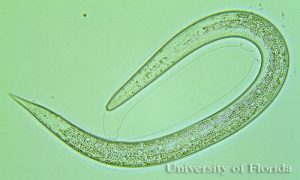 We’ve all heard about thinning hair, but there have been many calls recently about lawns looking thin as well. Rather than lush green grass, many homeowners are facing lawns with bare spots of dirt, or grass that is stunted and yellowing before dying. This can be caused by many things, but one cause that is not well known are nematodes.
We’ve all heard about thinning hair, but there have been many calls recently about lawns looking thin as well. Rather than lush green grass, many homeowners are facing lawns with bare spots of dirt, or grass that is stunted and yellowing before dying. This can be caused by many things, but one cause that is not well known are nematodes.
Nematodes are microscopic worm-like animals that are natural to our sandy soils. Many species are beneficial and feed on bacteria, fungi and other organisms in the soil, but many others are unfortunately plant parasites. Nematodes feed on the roots of grasses, ornamental trees and shrubs, even fruit and vegetable crops. Typically, when the lawn is healthy and well maintained the nematode populations stay in check. However, stressful environmental conditions or improper lawn maintenance can stress the grass just enough to allow nematode numbers to boom and for damage to occur.
There are many stressors that can trigger nematode damage in our Florida lawns, but the most common human-caused stressor I would say is overwatering. Particularly with all of the rain we’ve been receiving these past few months your irrigation systems should be turned off. During the drier seasons of spring and fall water no more than twice a week giving between ½” – ¾” of water each time the sprinklers run. In the winter, water once every 10-14 days and do not fertilize while the grass is dormant.
If you suspect nematode damage in your yard, feel free to send in photos and bring in samples so we can first identify if there are other issues going on. Oftentimes fungal diseases coincide with nematode damage because the grass is weakened and more susceptible. Take samples in an area of lawn that is not dead but showing disease symptoms. I typically tell folks to dig a sample about 4”x4” in size and if you want to test for nematodes, dig down about 6 inches and bring the entire sample of grass and dirt with you to the office. We’ll keep the grass for our diagnosis and will help you send the dirt and roots to the University of Florida Nematode Assay Lab where they’ll analyze the sample under microscopes. If significant numbers of nematodes are found, nematicides will be recommended but only for use by a professional licensed pesticide applicator. There are unfortunately no known nematicides at this time to treat ornamental trees, shrubs, flower beds or home gardens. The best treatment for nematodes is prevention by planting resistant varieties and utilizing best management practices.
 0
0
